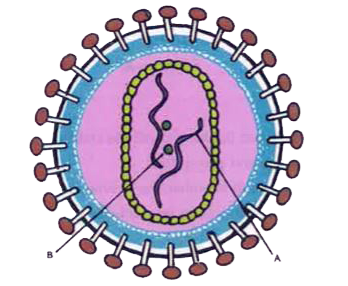Why is AIDS called secondary immunodeficiency?
Step-by-Step Text Solution
1. Understanding AIDS:
- AIDS stands for Acquired Immunodeficiency Syndrome. It is a condition characterized by a weakened immune system, which means the body's ability to fight infections and diseases is compromised.
2. Nature of Immunodeficiency:
- The term "immunodeficiency" refers to a deficiency or weakness in the immune system. In the case of AIDS, this deficiency is acquired during a person's lifetime, rather than being present at birth.
3. Cause of AIDS:
- AIDS is caused by the Human Immunodeficiency Virus (HIV). This virus specifically targets and destroys certain immune cells, particularly T-helper cells, which play a crucial role in coordinating the immune response.
4. Mechanism of HIV:
- HIV enters the body and infects immune cells, particularly macrophages and T-helper cells. It uses the host's cellular machinery to replicate itself, leading to a decrease in the number of T-helper cells.
5. Role of T-helper Cells:
- T-helper cells are essential for signaling B-cells to produce antibodies. A reduction in T-helper cells means that B-cells do not receive the necessary signals to produce antibodies, leading to a weakened immune response.
6. Primary vs. Secondary Immunodeficiency:
- Primary immunodeficiency is a condition that is present at birth due to genetic factors affecting immune cells. In contrast, secondary immunodeficiency, such as AIDS, develops later in life due to external factors, such as infections (like HIV), malnutrition, or drug use.
7. Conclusion:
- Therefore, AIDS is termed "secondary immunodeficiency" because it is not an inherited condition but rather one that is acquired due to the infection with HIV, which leads to a significant decline in immune function.
- AIDS stands for Acquired Immunodeficiency Syndrome. It is a condition characterized by a weakened immune system, which means the body's ability to fight infections and diseases is compromised.
- The term "immunodeficiency" refers to a deficiency or weakness in the immune system. In the case of AIDS, this deficiency is acquired during a person's lifetime, rather than being present at birth.
- AIDS is caused by the Human Immunodeficiency Virus (HIV). This virus specifically targets and destroys certain immune cells, particularly T-helper cells, which play a crucial role in coordinating the immune response.
- HIV enters the body and infects immune cells, particularly macrophages and T-helper cells. It uses the host's cellular machinery to replicate itself, leading to a decrease in the number of T-helper cells.
- T-helper cells are essential for signaling B-cells to produce antibodies. A reduction in T-helper cells means that B-cells do not receive the necessary signals to produce antibodies, leading to a weakened immune response.
- Primary immunodeficiency is a condition that is present at birth due to genetic factors affecting immune cells. In contrast, secondary immunodeficiency, such as AIDS, develops later in life due to external factors, such as infections (like HIV), malnutrition, or drug use.
- Therefore, AIDS is termed "secondary immunodeficiency" because it is not an inherited condition but rather one that is acquired due to the infection with HIV, which leads to a significant decline in immune function.
Topper's Solved these Questions
- BOOK - MODERN PUBLICATIONCHAPTER - HUMAN HEALTH AND DISEASESEXERCISE - PRACTICE PROBLEMS - CANCER BIOLOGY26videos
HUMAN HEALTH AND DISEASES
- BOOK - MODERN PUBLICATIONCHAPTER - HUMAN HEALTH AND DISEASESEXERCISE - PRACTICE PROBLEMS - TOBACCO ADDICTION9videos
HUMAN HEALTH AND DISEASES
- BOOK - MODERN PUBLICATIONCHAPTER - HUMAN HEALTH AND DISEASESEXERCISE - PRACTICE PROBLEMS - IMMUNE SYSTEM19videos
HUMAN HEALTH AND DISEASES
- BOOK - MODERN PUBLICATIONCHAPTER - EVOLUTIONEXERCISE - CHAPTER PRACTICE TEST (SECTION-D)(CASE-BASED SHORT ANWER )(THREE MARK EACH)2videos
EVOLUTION
- BOOK - MODERN PUBLICATIONCHAPTER - HUMAN REPRODUCTIONEXERCISE - CHAPTER PRACTICE TEST (SECTION - D LONG TYPE QUESTION)2videos
HUMAN REPRODUCTION
Similar Questions
Why is SCID called primary immunodeficiency?
View SolutionImmuno - deficiencies are the diseases which occur due to impaired immune responses. These immuno - deficiencies may be primary or secondary. AIDS is a secondary immunodeficiency caused by a retrovirus Human Immunodeficiency Virus (HIV). Following diagram is that of HIV. Observe the diagram and answer the questions listed below the diagram :

(i) State one difference primary immunodeficiency and secondary immunodeficiency.
(ii) Why is HIV called a retrovirus?
(iii) Identify the parts of the diagram labelled as A and B.View Solution
Knowledge Check
- Question 1 - Select One
Assertion : SCID is a primary immunodeficiency.
Reason : It is a serious congenital immunodeficiency.AIf both the assertion and the reason are true and the reason is a correct explanation of the assertionBIf both the assertion and reason are true but the reason is not a correct exaplanation of the assertionCIf the assertion is true but the reason is falseDIf both the assertion and reason are false - Question 2 - Select One
Assertion : SCID is a primary immunodeficiency.
Reason : It is a serious congenital immunodeficiency.AIf both Assertion and Reason are true and the reason is the correct explanation of the assertion, then mark (1).BIf both Assertin and Reason are true but the reason is not the correct explanation of the assertion, then mark (20.CIf Assertion is true but Reason is false, then mark (3).DIf both Assertion and Reason are false. Then mark (4).
HIV (Human Immunodeficiency Virus) and AIDS (Acquired Immunodeficiency Syndrome )
View SolutionA deficiency of which one of the following minerals is most likely to lead to an immunodeficiency?
View SolutionInfections occuring in AIDS due to immunodeficiency.
View SolutionWhy is construction industry called a secondary industry ?
View SolutionWhy is Amoeba called immortal ?
View SolutionWhy is Sulekha called 'Bholi'?
View Solution
